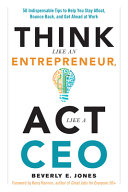

A growth mindset is fundamental for entrepreneurs and CEOs alike. This concept, popularized by psychologist Carol Dweck, suggests that abilities and intelligence can be developed through dedication and hard work. The book emphasizes that adopting a growth mindset allows leaders to view challenges as opportunities for growth rather than obstacles. This perspective fosters resilience and encourages continuous learning. Entrepreneurs and CEOs who embrace this mindset are more likely to innovate, adapt to change, and inspire their teams to pursue excellence. The book provides practical strategies for cultivating a growth mindset, such as seeking feedback, embracing failure as a learning opportunity, and setting ambitious but achievable goals.
Continue readingSuccessful entrepreneurs and CEOs must have a clear vision for their business and the ability to translate that vision into actionable strategic plans. The book outlines the importance of defining a compelling vision that resonates with stakeholders, including employees, customers, and investors. A well-articulated vision serves as a guiding star, helping leaders navigate challenges and make informed decisions. Additionally, the book discusses the process of strategic planning, including conducting market research, identifying competitive advantages, and setting measurable objectives. By aligning their teams around a common vision and strategic goals, leaders can foster collaboration and drive organizational success.
Continue readingDecision-making is a critical skill for entrepreneurs and CEOs, as the choices they make can significantly impact their organizations. The book explores various decision-making frameworks and emphasizes the importance of data-driven decision-making. It encourages leaders to gather relevant information, analyze options, and consider potential outcomes before making decisions. The author also highlights the role of intuition and experience in decision-making, suggesting that a balance between analytical thinking and gut instinct can lead to better outcomes. Furthermore, the book addresses the need for leaders to be decisive and take calculated risks, as hesitation can hinder progress and innovation.
Continue readingA successful entrepreneur or CEO understands that their organization's success hinges on the strength of their team. The book emphasizes the importance of hiring the right people, fostering a positive workplace culture, and empowering employees to take ownership of their roles. It offers insights into effective recruitment strategies, team dynamics, and leadership styles that promote collaboration and engagement. The author also discusses the significance of ongoing training and development, as well as recognizing and rewarding employee contributions. By prioritizing team building and creating an inclusive environment, leaders can enhance productivity and drive organizational growth.
Continue readingNetworking is a vital component of entrepreneurship and leadership. The book highlights the importance of building and maintaining relationships with various stakeholders, including mentors, peers, customers, and industry experts. It provides practical tips for effective networking, such as attending industry events, leveraging social media, and seeking out mutually beneficial collaborations. The author emphasizes that strong relationships can lead to new opportunities, insights, and support. Additionally, the book discusses the role of emotional intelligence in networking, suggesting that understanding and managing one's own emotions, as well as empathizing with others, can enhance relationship-building efforts.
Continue readingEntrepreneurs and CEOs must possess a solid understanding of financial principles to make informed decisions and drive their organizations toward profitability. The book covers essential financial concepts, such as budgeting, forecasting, cash flow management, and investment strategies. It emphasizes the importance of analyzing financial statements and key performance indicators to assess organizational health. The author also discusses the need for leaders to communicate financial information effectively to their teams, fostering a culture of financial literacy. By developing financial acumen, leaders can make strategic decisions that align with their organization's goals and ensure long-term sustainability.
Continue readingThe ability to bounce back from setbacks and adapt to changing circumstances is crucial for entrepreneurs and CEOs. The book explores the concept of resilience, highlighting that challenges and failures are inherent to the entrepreneurial journey. It provides strategies for developing resilience, such as maintaining a positive outlook, practicing self-care, and seeking support from peers and mentors. The author also emphasizes the importance of adaptability in a rapidly changing business landscape. Leaders who can pivot their strategies in response to market shifts and emerging trends are more likely to thrive. The book encourages readers to embrace change and view it as an opportunity for growth and innovation.
Continue readingThe reading time for Think Like an Entrepreneur, Act Like a CEO depends on the reader's pace. However, this concise book summary covers the 7 key ideas from Think Like an Entrepreneur, Act Like a CEO, allowing you to quickly understand the main concepts, insights, and practical applications in around 24 min.
Think Like an Entrepreneur, Act Like a CEO is definitely worth reading. The book covers essential topics including Embrace a Growth Mindset, Vision and Strategic Planning, Effective Decision-Making, providing practical insights and actionable advice. Whether you read the full book or our concise summary, Think Like an Entrepreneur, Act Like a CEO delivers valuable knowledge that can help you improve your understanding and apply these concepts in your personal or professional life.
Think Like an Entrepreneur, Act Like a CEO was written by Beverly E. Jones.
If you enjoyed Think Like an Entrepreneur, Act Like a CEO by Beverly E. Jones and want to explore similar topics or deepen your understanding, we highly recommend these related book summaries:
These books cover related themes, complementary concepts, and will help you build upon the knowledge gained from Think Like an Entrepreneur, Act Like a CEO. Each of these summaries provides concise insights that can further enhance your understanding and practical application of the ideas presented in Think Like an Entrepreneur, Act Like a CEO.